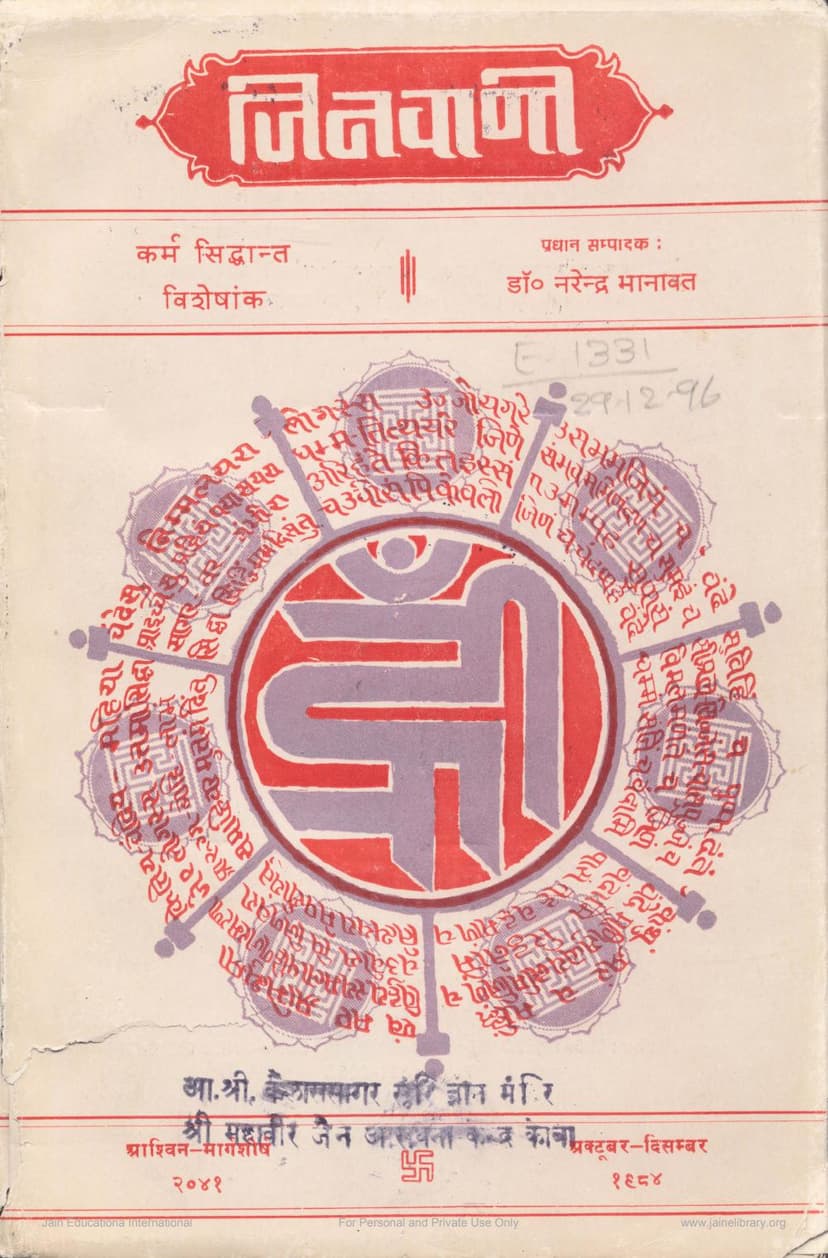Jinvani Special Issue On Karmsiddhant Visheshank 1984
Added to library: September 2, 2025

Summary
This document is a special issue of "Jinvani" magazine from October-December 1 84, dedicated to the "Karmasiddhi" (Karma Doctrine) and published in honor of the 75th birthday (Amrit Mahotsav) of Acharya Shri Hastimalji M.S. The issue was compiled and published by the Samyag Gyan Pracharak Mandal.
The special issue is divided into four main sections:
Part 1: Classical Discussion of the Karma Doctrine (Pages 7-234) This section delves into the theoretical and philosophical aspects of the Jain Karma doctrine. It features 31 articles by various scholars and spiritual leaders, including:
- Classical Jain texts on Karma: Discussions on the nature of karma, the relationship between karma and the soul, the existence and types of karma, karma and effort, karma and spiritual concentration (leshyas), the ripening of karma, and the utility of the karma doctrine in life.
- Karma in other Indian Philosophies: Comparative studies of karma in Buddhism, Bhagavad Gita, Sankhya, Mimamsa, and its conceptualization in Western philosophy.
- Historical overview of Jain Karma literature: A brief history and description of the Jain texts related to karma.
Part 2: Karma Doctrine and Social Thought (Pages 235-308) This section explores the practical and social implications of the karma doctrine. It includes 15 articles that examine:
- Individual and Collective Karma: The interplay between personal actions and their impact on society.
- Karma and Work Ethics: The role of karma in shaping professional conduct and societal responsibilities.
- Consequences of Karma: The tradition of karma's results and its connection to individual liberation and societal progress.
- Karma and Human Effort: The importance of diligence and perseverance in overcoming karmic influences, drawing insights from thinkers like Swami Sharanananda, Bal Gangadhar Tilak, and Mahatma Gandhi.
- Karma, Vikarma, and Akarma: Discussions on different states of action and inaction according to Acharya Vinoba Bhave.
- Karma and Causality: The relationship between actions and their consequences, as discussed by Acharya Rajneesh.
- Meditation and Karma Yoga: The role of meditative practices in managing karma.
- Karma Doctrine and Modern Thought: Connecting ancient principles to contemporary philosophical and societal challenges.
- Social Context of Karma: Understanding karma's influence on social structures and individual behavior.
Part 3: Karma Doctrine and Modern Science (Pages 309-330) This section attempts to bridge the gap between the Jain karma doctrine and modern scientific understanding, featuring four articles that explore:
- Karma and Modern Science: Exploring potential parallels and interpretations.
- Scientific Perspective on Karma: Examining the doctrine through the lens of scientific inquiry.
- Jain Karma Doctrine and Science: A discussion on the mutual understanding and convergence between the two.
Part 4: Jain Stories of Karma and Human Effort (Pages 331-352) This section provides stories and anecdotes from Jain literature that illustrate the principles of karma and the power of human effort. It includes:
- Jain stories about Karma and Human Effort: General narratives on the topic.
- Specific stories: "The Dough Rooster," "Siya's Revenge," "The Magic Garden," "The Two Separated Sadhaks," and "The Payment of Karma."
The issue also includes an editorial, a list of contributing authors, and advertisements. The editorial emphasizes that the publication is a tribute to Acharya Shri Hastimalji's teachings on self-study (Jnana-Darshan) and equanimity (Samayika-Sadhana), and his efforts to guide people towards self-realization and freedom from karma. It also clarifies that the views expressed by the authors do not necessarily reflect the opinions of the editors or the publisher.
The publication was conceived approximately four years prior to its release, with an initial intention to include special material on karma and modern science, which was not fully realized. The editors express gratitude to Shri Kanhaiyalal Lodha for his significant contribution to material collection and to all the scholars, monks, and writers who sent their works. Advertisers are also thanked for their financial support.